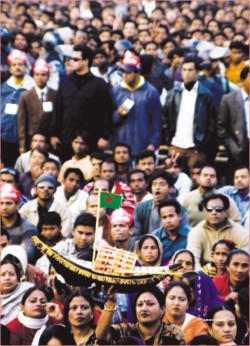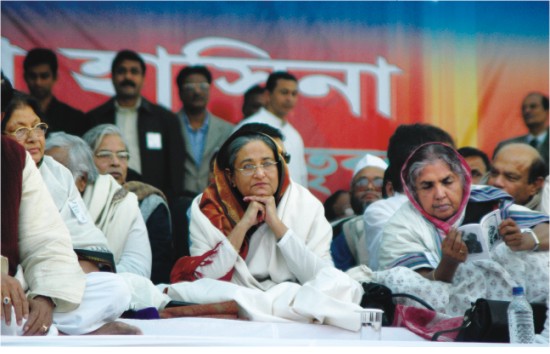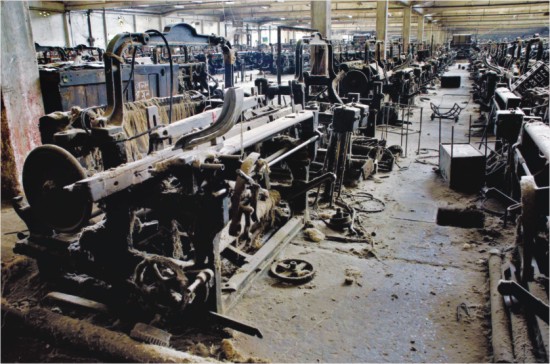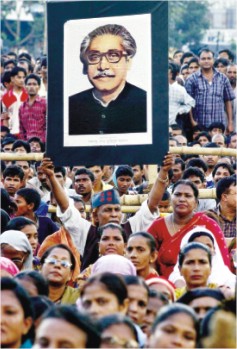
Inside
|
What is at Stake Only the Awami League can put Bangladesh back on track, argues Sajeeb Wazed Over the past two years we have heard many times how our politics needs a revolutionary change. We need to throw out all the old politicians and start fresh. How our political system, and indeed our constitution, needs to be rewritten in order to create a utopia, where everyone will live happily ever after.
After two years of suspended rights, blatant abuse of justice and harassment of our leaders and businessmen, it turns out that 96% of our people cannot wait for a return to democracy. Our economy, already hurting from the unbridled corruption of the immediate past BNP-Jamaat alliance government, has sunk further despite the best efforts of several highly educated people. Even our political scene is pretty much back to square one. The revolution is dead. Time and again I see opinions published, usually by the same authors, about how both political parties are the same, both "begums" are the same, etc. This has become a chant for a select few critics. It is as if they cannot find anything else to say. Why do I bring this up right after my opening paragraph? It is because both camps have been clamouring for a revolution, the first in our country and the second within the political parties. Despite the best efforts of men with guns, neither of these has taken place. The reason for this is something those of us involved in politics understand, which cannot be learned through a degree, even one from Princeton or Oxford. The secret we politicians know that others do not is this: Revolutions only work when a government has become autocratic. It does not work against a democracy. A revolution only succeeds if the common man joins in. Without this, even the massive organisation of the largest political party cannot bring about a revolution. A democracy can only be changed through another means. The technical name for this is election. The only way to improve a democracy is through evolution. Evolution, as opposed to revolution, is a much more gradual, long-term process. At times it appears that nothing is changing. However, change eventually comes, often in fits and starts. After all, you do need periods of stability. Otherwise nothing would ever get done. Most importantly, at its core, evolution improves the system through survival of the fittest. In a democracy, leaders and parties who improve the lot of the people survive and grow stronger. Those who do not, slowly lose their popular support and fade into insignificance. This is how political evolution works. In this regard, the Awami League has proven itself to be an extraordinary survivor. Not counting its travails through our quarter century struggle for independence, it has endured the murder en masse of its entire top tier of leadership. This was followed by 15 years of political persecution by dictators. It has survived two attempts by the BNP to retain power through massively rigged elections. Now, it has survived two years of a variety of schemes cooked up by the brightest minds in our country to destroy it under a quasi-military regime. The reason for this survival is that the Awami League has evolved slowly through the entire time. Just as with nature's evolution there have been long stretches where little has changed. However, in these steady periods it has accomplished a lot. These accomplishments have been focused on improving the lives of the majority of our people. This is why the Awami League has not only survived, but grown steadily stronger. As an example, I would like to highlight our accomplishments in one area, the economy. This happens to be the area of most concern to the largest majority of our people. The one economic achievement that impacted the greatest proportion of our population was our extremely successful control of inflation. Even through the Asian financial crisis of the late 90s we kept inflation at a steady 1.59%. The price of rice stayed at Tk. 12-15 per kilo. For only the second time in Bangladesh's history we produced a surplus of grain and were even able to export a significant amount. Can you guess when we were self-sufficient in grain production for the first time? It was under the previous Awami League government of my grandfather, Bongobondhu. Not only could the BNP government not match this the first time they were in power, but when they returned to power they promptly turned our surplus into a deficit, resulting in increasing prices once again. This did not happen by luck or chance. This was a direct result of the diametrically opposing policies adopted by the two parties. The Awami League considers food a basic necessity that must remain accessible to everyone. Our food source and price must not depend on factors outside the country. Therefore we subsidised our farmers and fertiliser production and encouraged new technologies such as genetically engineered seeds in order to enhance production.
The BNP, on the other hand, believed that we could procure grain and fertiliser cheaper on the world market and so it was wasteful to subsidise our farmers. This has the added benefit of giving a few businessmen close to the ruling establishment the opportunity to profit in importing these items. Of course, this only works as long as world market prices do remain lower. World market prices tend to fluctuate and are difficult to predict at best. If and when they do go up, the price of food in Bangladesh goes up as well. This is precisely what happened. On other economic fronts, the Awami League is the party responsible for greatest share of our innovation and progress. We privatised the mobile telephone network which made cellular telephones affordable for the masses. The previous BNP government kept it a monopoly owned by one of their own ministers! This kept prices well out of reach of the common man. We privatised power generation and left the country with a surplus of power production capacity. Once again, the next BNP government promptly turned this into a severe deficit. This deficit, combined with the unprecedented corruption of their government, severely hurt our businesses and, as a consequence, our economy. The Awami League privatised the media, airlines and banks, just to name a few others. All this led to increased competition, better products and lower prices for consumers. It also brought about a boom in the business climate which allowed companies to flourish. These in turn created new jobs, reduced unemployment, and grew the middle class. As the middle class grows, the consumer market within the country grows. This in turn drives increasing business profits and the cycle continues upwards. If the Awami League's policies could have been maintained, our economy would have grown exponentially. Unfortunately for the vast majority of our people, this was not to be. Whatever your opinion on the 2001 elections, I would like to point out that they were in fact very close. In terms of the popular vote, the BNP and Awami League were virtually tied. Moreover, the Awami League did not lose any popular support. Rather, its share of the popular vote had increased over the previous election in which it had won.
Just as in nature's evolution, the Awami League is now in a period of change. A large number of new leaders and parliamentary candidates have emerged. This evolution was not dictated. Rather, all the new candidates were nominated by the party grassroots. The new leaders rose by earning the respect and support of the party workers in defending the party against the attacks of those who attempted to destroy it. The people most popular in their constituencies got nominated and the leaders most capable of defending the party rose. This is the perfect example of political evolution improving the party. Now the party is even stronger. Going back to the topic of the economy, you will see more of the same from the Awami League. I consider our economic policies a resounding success. If we win these upcoming elections, as I believe we shall, you will see us take them even further. We will open up our economy even more, but we will do so in a planned manner with a long-term vision. The party president has laid out her "Vision 2020" plan to eradicate hunger, illiteracy, shortage of power, etc. Not only is this possible, but we have demonstrated that we are the only party that can. Our one constraint has always been our limited finances. We have always had to hold out our hands to donors to undertake our own development. I believe that this may no longer necessary. Just take a look at our own Dhaka Stock Exchange. As the middle class grows and more people have money to invest, we will soon be able to turn to our own capital markets to finance large infrastructure development projects. Of course, this depends on the middle class having money to spare for investments. With the skyrocketing prices of essentials during both the previous BNP-Jamaat government and the present regime, our middle class is hurting. We need to get our economic engine running again at full steam. As the past seventeen years have shown, only the Awami League is capable of accomplishing this.
With regards to privatisation, we plan to continue but in a much more controlled manner. To give you one example of our planned approach, I would like to highlight the shutdown of the Adamjee Jute Mill. My mother had planned to do this, but instead of just shutting it down her plan was to rehabilitate the employees first. Other than the direct employees of the factory, there is a small ecology that has developed around the mill. There are the families of the employees who live there. There are a multitude of small businesses, tea stalls, and traders that provide goods and services for the employees and their families. Shutting down the factory not only affects the factory workers themselves, but it hurts the livelihoods of all of these people as well. If the factory worker does not have income, he cannot afford to spend money on groceries or clothes. Thus, shutting down Adamjee resulted in unemployment for a huge number of people. My mother's plan was to first develop an alternate industry in that area. The most likely candidate was a steel mill, but any other industry would suffice just as well. The Adamjee workers could then be given to opportunity to be retrained to work in that industry. Once that was set up Adamjee could be shut down. This way the majority of its workers would still have a job and the surrounding small businesses and traders would keep theirs as well. Such rehabilitation will be the crux of our privatisation schemes. Through this we will be able to reduce the government expenditure. It will take longer this way, but it will be far better for the workers who are currently employed in the state owned enterprises. The BNP had no such vision. They simply threw everyone out of work. As the private sector grows it will be able to provide more jobs, usually with better pay than the government sector. This in turn will encourage more new entrants to the workforce to go to the private sector. In the long term we will be able to reduce the size of the government. This will have several positive effects. It will reduce bureaucracy and red tape making life easier for everyone. It will also allow the government to increase salaries for the smaller public sector work force. As government employee pay increases, they will have less need and incentive to be corrupt. This is how corruption can be reduced. As the past two years and our previous military interventions have shown, you cannot reduce corruption by suspending democracy and arresting everyone in sight. Absolute power corrupts absolutely and in the past two years we have seen an increase in corruption in our law enforcement, judiciary, and military. This is according to Transparency International, the much ballyhooed anti-corruption watchdog. For all the criticism of the protests of October 2006, let us not forget that if the Awami League had not done so, what would have been the consequences for Bangladesh? Today, you would have had a ruthless, corrupt BNP-Jamaat government back in power. Our economy would be in even worse shape. It would be guaranteed that five years later we would see another rigged election. In equating both parties, people forget that the only peaceful transfer of power our country has ever witnessed was at the end of the Awami League's term in 2001. The BNP has chosen to rig elections each time. This is a fundamental difference in character between the two parties. The BNP is willing to violate our laws, the constitution, indeed do anything just to stay in power and make money. They have done so each time. Only the Awami League has the integrity and vision to take Bangladesh forward. Only the Awami League has safeguarded the fundamental rights and needs of our people. I do not support the Awami League simply because of my family. I chose to do so because I believe in it. It is the only large, truly democratic party in Bangladesh. It is precisely because of its internal democracy that it sometimes makes mistakes. The decision of the majority is not always the best one. However, as a professor of mine at Harvard told me, a democracy is the only form of government that has the ability to correct itself. The Awami League has the ability to correct itself. BNP and Jamaat do not. Sajeeb Wazed is an Adviser to Sheikh Hasina. He has Masters in Public Administration from Harvard’s Kennedy School of Government. |



